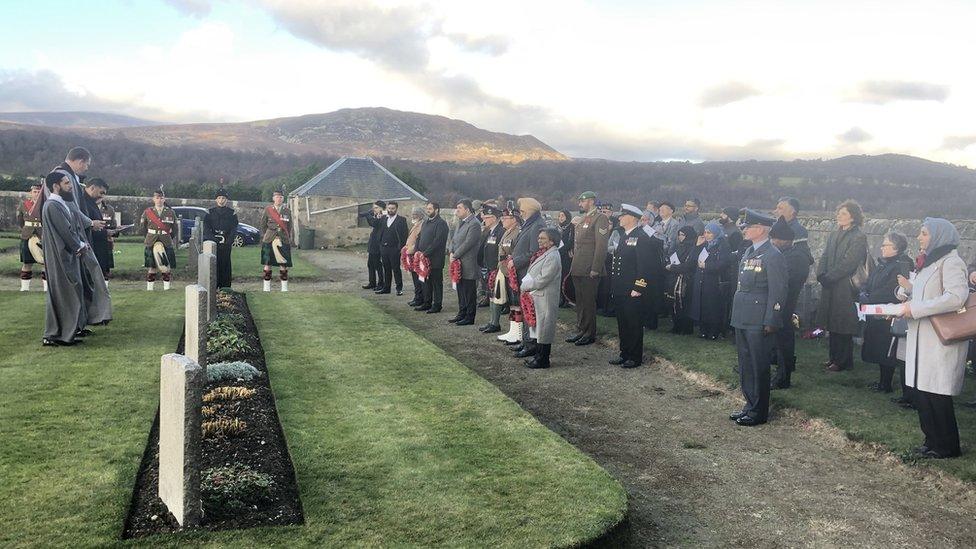'Nobody seemed to care' says woman who tended Indian WW2 graves
- Published
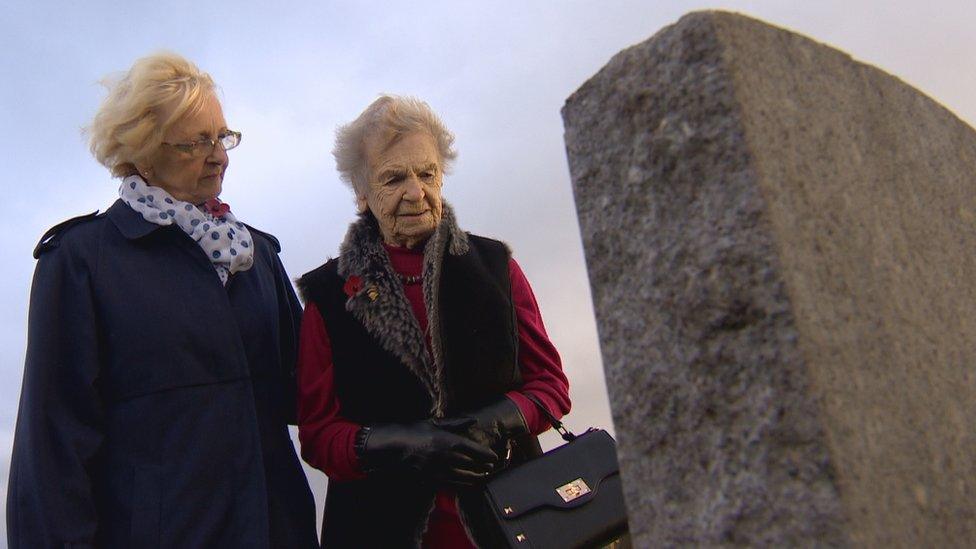
Mrs Harling has tended to the graves for more than 70 years
For more than 70 years, Isobel Harling has tended the graves of Indian servicemen who fought and died during World War Two.
In Kingussie, nine graves belong to men who served in Force K6, a Muslim transport corps who rode mules and delivered supplies to front-line soldiers.
Mrs Harling hopes the families of the men buried at this cemetery know that their final resting place is well looked after.
She lost her own brother during the war, when he was shot down in Leuven in Belgium, and she has often thought about the people tending his grave.
Her own loss influenced her dedication to the graves of the Indian soldiers.
"They came over from home and they gave their lives for us. It's only right that we should remember them. The people in Leuven look after their graves, so it's only right that we look after the boys that were buried here."
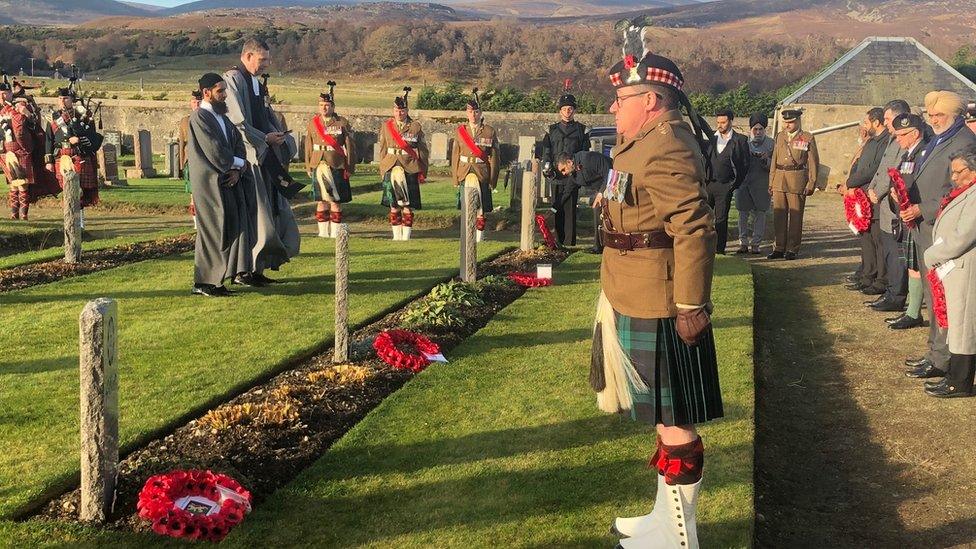
Passages from the Bible and Quran were read out during a recent remembrance service
Mrs Harling first started visiting the graves in her early 20s, often cycling to the graveyard by herself.
When the local gravedigger noticed her tending the graves, he told her not to bring any of her own equipment because she could use his while she was there.
With help from the gravedigger, she has spent years cutting the grass, placing flowers on the graves and keeping the cemetery tidy.
Now in her 90s, she regrets that she has had to slow down a little.
Mrs Harling has never met the families of the men buried at Kingussie but she hopes the families know the graves are being cared for in the Highlands.
"Nobody seemed to care and that bothered me. So when I jumped on my bike and cycled down, no one knew where I was going," she recalled.
"They (K6 soldiers) used to come down into the village, and they would come to some of the functions and dances... they were very quiet, very nice and mannerly."
At the start of the war, 1,723 men from India disembarked at Marseilles with 2,000 mules, sent to France to help the British Expeditionary Force deliver supplies to the front lines. These were the Force K6: Punjabi Muslims of the Royal Indian Army Service Corps (RIASC).
Five-months later, struggling with one of the harshest winters of that time, the men faced the German blitzkrieg, with two companies escaping from Dunkirk and another company via St Nazaire. A fourth ended up in a German POW camp.
It was a foreign terrain for these men. Having come from the Punjab region, the men were accustomed to a warmer climate.
Indian troops were sent to France and used their mules to deliver supplies to the front line during WW2.
After their escape from France, they spent three-and-a-half-years in Britain.
They were part of preparations for one of Churchill's plans to invade Northern Norway to help secure German airfields.
The plan was never approved, but the Force K6 still accompanied the British infantry brigades, training them in loading, and how to handle mules.
'They belong here'
Some of the men were born in what is now Pakistan and others from Kashmir. During their time in Scotland, there were inevitable casualties.
The youngest of the nine men was Mushtaq Ahmad, who was only 21-years-old when he was killed in action on 19 October 1942. The oldest in the group was Ali Bahadur, who died aged 38.
Thirteen of the men are buried in four cemeteries across Scotland. Most of them buried in Kingussie, as their Indian General Hospital was nearby.
Omar Sheik the founder of the Colourful Heritage Project said: "I think the contribution of the soldiers is over five million soldiers in the great wars, 2.5m British Indian soldiers just in World War Two. The largest ever volunteer army.
"The reality is not enough has been done to remember them and their contribution. The fact we are here, doing an inaugural service in 2018, at the largest single gravesite of Force K6 soldiers says everything.
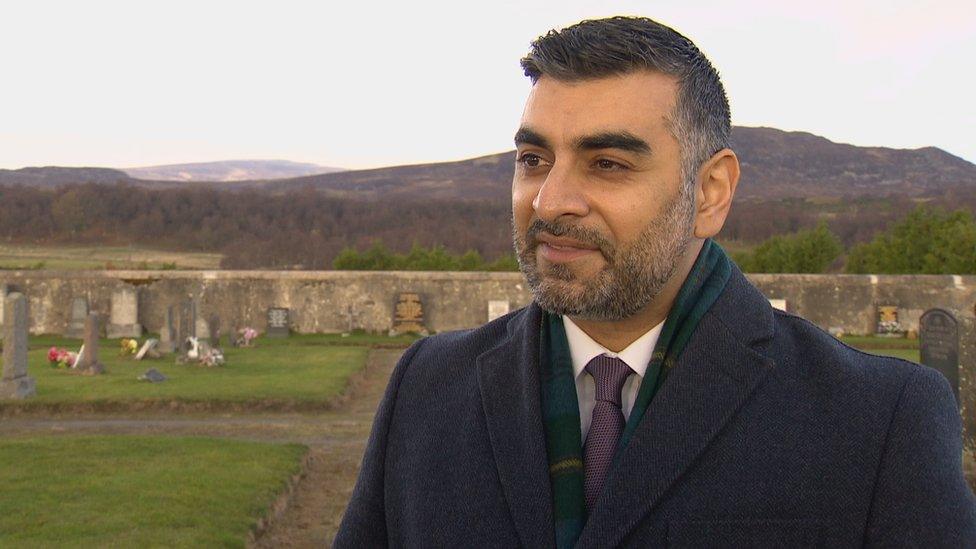
The remembrance service was organised by Colourful Heritage and the British Armed Forces
"Many of their relatives don't even know where they are or where they are buried, that itself is very poignant."
For many people in the Highlands this would have been their first time seeing a person from India.
"They were welcomed immensely by the local communities."
Organised by Colourful Heritage and the British Armed Forces, a multi-faith remembrance service took place on Thursday to honour those men who gave their lives for Britain.
Mr Sheik says its a unique story and demonstrates a special connection between Scotland and the British Indian Army.
"In Churchill's own words, 'had the British Indian Army not arrived when they did, the course of the war might have been very different'.
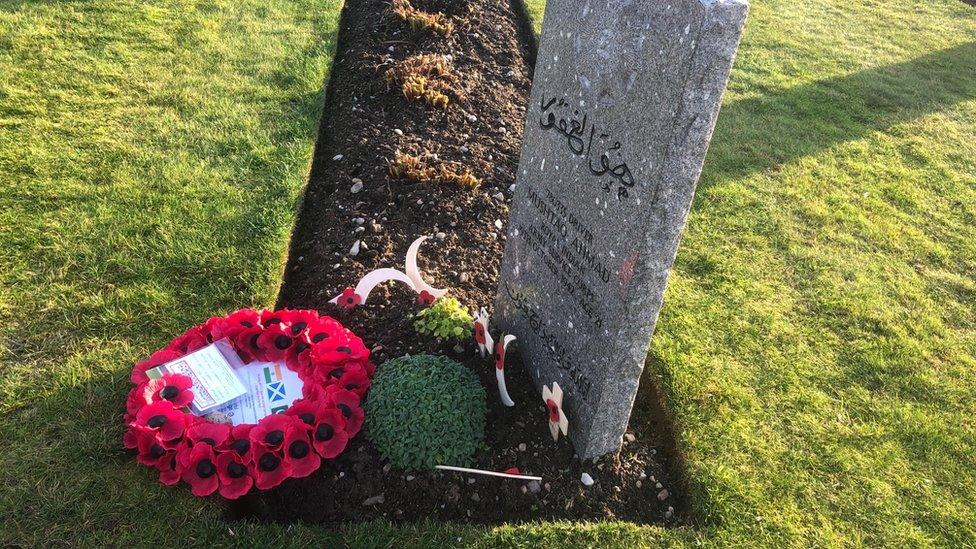
Nine Indian men lay buried here in Kingussie Cemetery, the youngest was Mushtaq Ahmad, who died aged 21
"A lot more needs to be done to commemorate the contribution of the British Indian Army. In the backdrop of Brexit and the anti-migrant narrative and the rise of the far right politics and rise in Islamophobia... now more than ever this story needs to be told.
Mrs Harling feels like the men belong in Highlands, a place where they died and remain buried, but not forgotten.
"They gave up their lives for us, for our freedom. They've been there for a long time now," she said.
"It was very fascinating to see them marching with their mules, a sight I never forgot."
- Published15 November 2018
